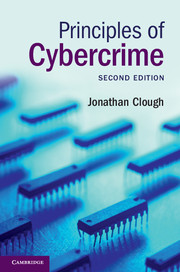Book contents
- Frontmatter
- Contents
- Preface
- Acknowledgements
- Table of Legislation
- Table of Cases
- List of abbreviations
- Part I Introduction
- Part II Computer as target
- Part III Fraud and related offences
- 7 Fraud
- 8 Criminal copyright infringement
- 9 ‘Spam’
- Part IV Content-related offences
- Part V Offences against the person
- Part VI Jurisdiction
- Bibliography
- Index
7 - Fraud
from Part III - Fraud and related offences
Published online by Cambridge University Press: 05 October 2015
- Frontmatter
- Contents
- Preface
- Acknowledgements
- Table of Legislation
- Table of Cases
- List of abbreviations
- Part I Introduction
- Part II Computer as target
- Part III Fraud and related offences
- 7 Fraud
- 8 Criminal copyright infringement
- 9 ‘Spam’
- Part IV Content-related offences
- Part V Offences against the person
- Part VI Jurisdiction
- Bibliography
- Index
Summary
Fraud online
Attn: … our Fraud Monitoring Unit have noticed that you have been transacting with some impostors and fraudsters who have been impersonating the likes of former Central Bank governor and fake officials from fake Banks, and claiming to be the official from the office of the presidency On how you have lost outrageous money to these impostors. We guarantee a compensation payment US$1.500.000.00 as a mandate from United State of America under the supervision of the united nation to make sure all debts owed to contractors like you are being paid out … do furnish me with your detail as listed below.
In the first edition, this chapter began with an extract from that most emblematic of online frauds; a so-called Nigerian mail fraud. A form of what is known as an ‘advance fee’ fraud, the unsolicited message typically asks the recipient to help the sender to arrange for a large amount of currency to be illegally moved out of the country. For this, they need the recipient's bank account details and in return will pay a hefty commission. Once the recipient indicates interest in the proposal, they find that payment of upfront funds is required, ostensibly to deal with bribes or red tape, before the money can be released. Of course, the promised commission never eventuates and the victim's money is lost. In some cases, persuasion is replaced with intimidation and there are reports of victims being threatened, kidnapped and even killed while seeking to recover their funds.
Perfectly illustrating the capacity of fraudsters to adapt over time, the above email seeks to scam those who have already been scammed. It may act as a ‘phishing’ email; tricking the recipient into providing their bank account details. Or, they may try their luck and see if the victim can once again be persuaded to provide upfront fees that will never be seen again.
The internet is a paradise for those who prey upon the gullible, the greedy or the vulnerable. First, it provides unprecedented access to victims. The Nigerian email fraud, for example, was originally perpetrated by conventional mail. The advent of the internet allows offenders to reach millions of potential victims at virtually no cost. The more people who can be contacted, the greater the chance someone will be taken in by the scam.
- Type
- Chapter
- Information
- Principles of Cybercrime , pp. 209 - 254Publisher: Cambridge University PressPrint publication year: 2015



